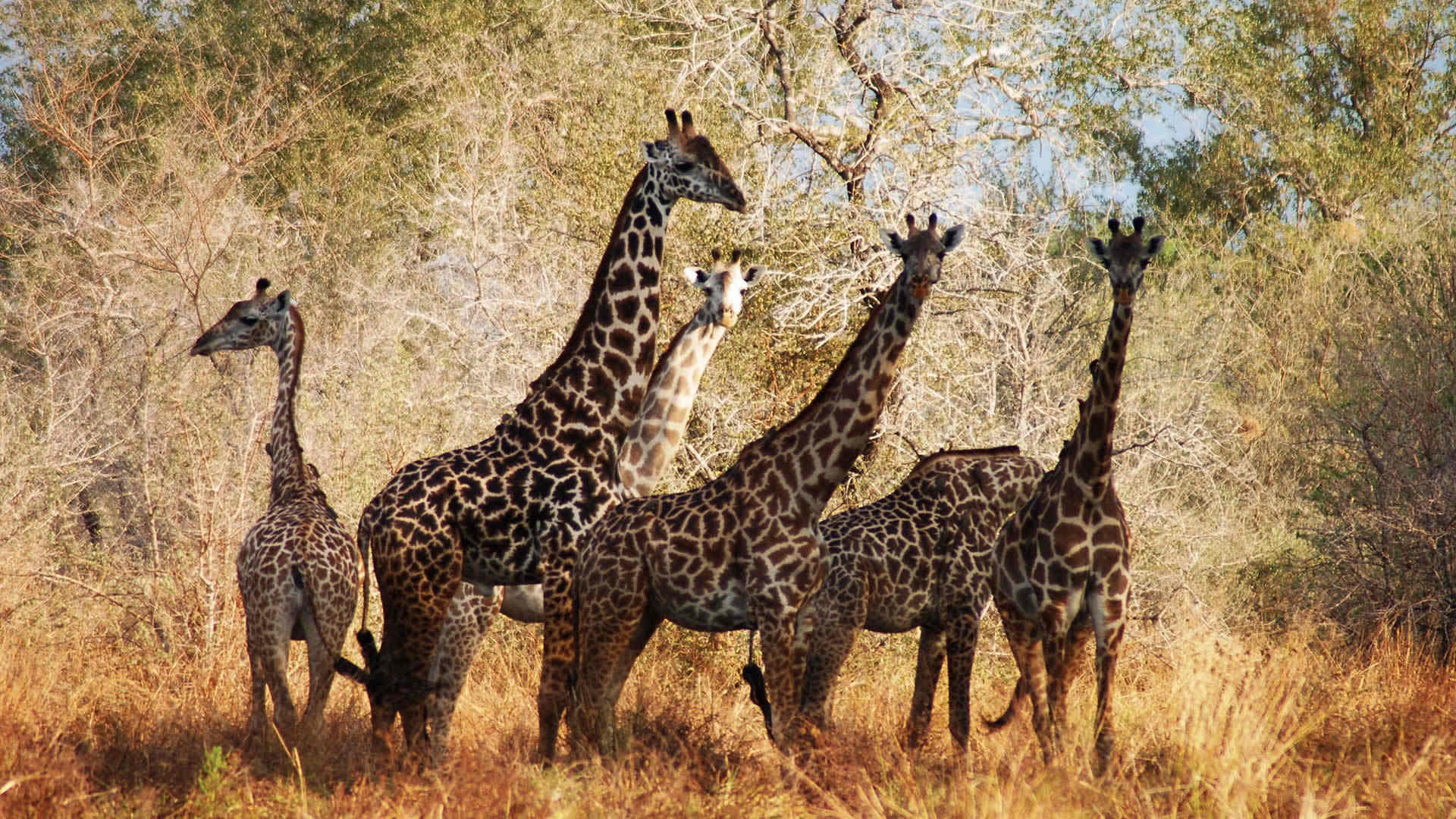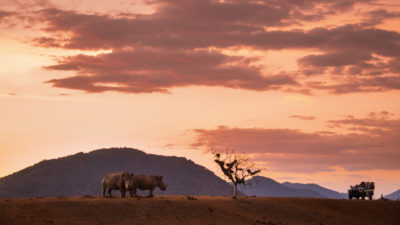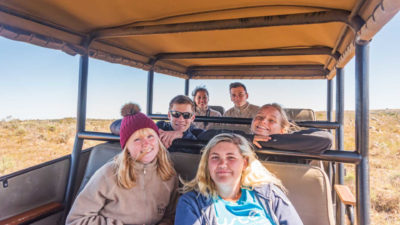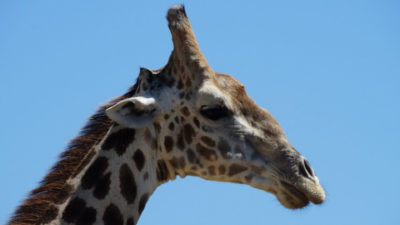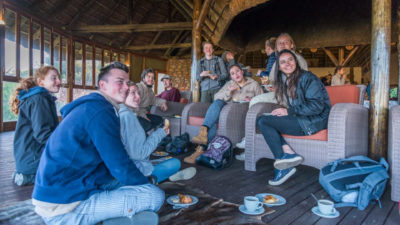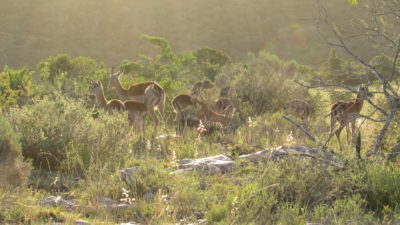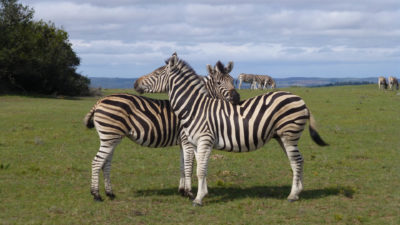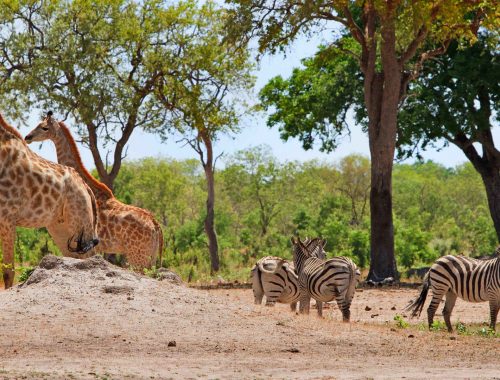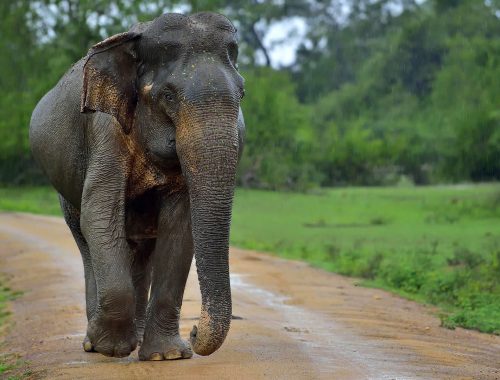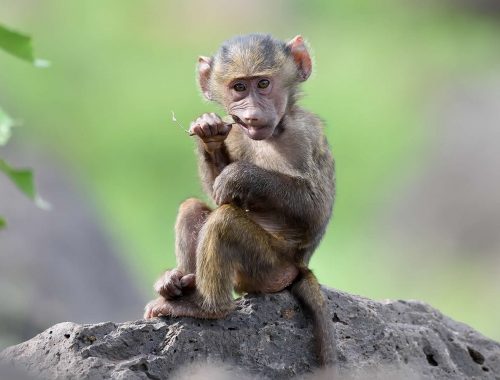Take your first steps on the path to working with wildlife in Africa on this well-regarded game ranger course. Through both practical and theoretical learning, you will achieve your Apprentice Field Guide Certificate, a qualification which is known around the world. With a Big 5 game reserve as your classroom, it’s not all about getting the qualification though!
Duration: 8 weeks
Dates: See arrival dates and check availability here
Arrival day: Monday
Return day: Saturday afternoon / Sunday
Eligibility: General level of fitness required
Age: 18+
Highlights
- Enjoy safari drives at all times of day and night – including at sunrise and sunset
- Watch the lions laze under the trees, the elephants graze on the plains and the antelope leap through the bush
- A Big 5 game reserve as your classroom – could it be the best place in the world to learn a new skill?
- Qualifying as an apprentice field guide – amazing for the CV / resume, but also an amazing achievement
- Beaches, bungees, shark cage diving, swimming, exploring – need we say more?
- Add a conservation career course to support and apply for jobs after your trip
Description
Step off the beaten track and into the heart of an African wilderness, where you will train up to be a field guide on this game ranger training course. The 8 week game ranger course introduces you to the life of a game ranger, the animals on the reserve and the background knowledge that is key to gaining your recognised qualification. In addition to gaining hands-on experience working on the reserve, you will also be learning about geology and astronomy, weather and climate, animal identification and behaviour and conservation management.
How does it work?
The game ranger course is an 8 week long course that runs at various intervals in the year (see here for dates). The end goal is the FGASA Apprentice Field Guide Certificate, which would allow you to work as a field guide across Africa.
The first few weeks of the course focus on the general aspects of working in a game reserve. You will team up with the participants on the Big 5 project to gain exposure to the wildlife and to learn and understand the basics of life on a reserve. Please remember that this is a dynamic environment where things change quickly, and where tasks are demand-driven. You may become involved in tasks such as:
- monitoring of wild animals in the reserve
- conservation activities such as erosion control, removal of alien vegetation and planting native species
- fence patrols
- game captures
In addition, you will receive regular lectures and training in preparation for the examination at the end of the 8 week course. This includes:
- practical and theoretical training required to become a qualified field guide
- insight into geology and astronomy
- knowledge of weather and climate
- learning about basic ecology
- animal identification and management
- First Aid level 1
A written exam will be completed at the end of the game ranger course to enable you to obtain your Field Guide Association South Africa (FGASA) Apprentice Field Guide certificate. This is recognised across Africa. See here for more information about the FGASA Field Guide Certificate.
Looking to start a career in conservation?
Are you looking for paid work in the conservation sector after volunteering or interning? Oyster have teamed up with our friends at Conservation Careers who support people to find paid work in conservation following study or a career change. You can add their fantastic and flexible course to your volunteering trip with Oyster. Your Oyster experience will help add interest to your conservation resume as an eye catching addition to your job applications in future!
Accommodation
- On-site accommodation in shared single-sex dormitories
- Single-sex toilets and showers
- Lockers provided for your belongings
- Access to swimming pools, tennis courts and gardens throughout your stay
- Basic dormitory accommodation provided in Port Elizabeth for participants wishing to explore on the weekend (no extra charge)
Food
- Food is included throughout your stay at the reserve
- Three meals per day prepared for you by local cooks
- Breakfasts include cereals, bread, jams, tea, coffee and sometimes cooked options
- Lunches and dinners are buffet style and comprise of mainly western, African and Asian food
- If you choose to leave the reserve at the weekend, you will need to provide your own food
- Most dietary requirements can be catered for
Free time
- Your programme will keep you busy at the reserve from Monday to Friday, with weekends free for study, relaxation and exploring
- At the weekend many participants choose to head in to Port Elizabeth to enjoy the sea, surf and sand, as well as to use it as a base from which to explore the area
- Alternatively, you are more than welcome to remain at the reserve to enjoy the fantastic facilities there and simply relax
- Don’t forget that you will be working towards an exam and qualification, so you will need to dedicate free time to learning and revision too
Want to go travelling after your game ranger experience?
- We can arrange a week-long Garden Route tour after your time on the project.
- Follow the link to find out more about the Garden Route Tour.
Travel arrangements
Airport: Port Elizabeth (PLZ)
Arrival day: Monday before 17:00. You will be collected from the airport and transferred to the reserve
Departure day: Saturday after 12:00 or Sunday at any time
Supporting You
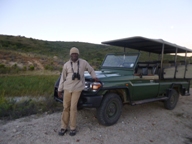
You will be working closely with the game rangers whilst taking part in this programme. They teach you their craft and get you involved in assisting them on the project, as well as preparing you for the examination. The full-time team who work in the offices to coordinate your programme will also there as a helping hand and can offer great advice on things to do on your weekends.
Included
- Access to your own personal ‘My Oyster’ account – our online portal where you can find out much more about the program and manage your booking
- Dedicated contact time with an experienced destination manager to discuss the project, answer any of your questions and for us to find out more about you
- Help and advice from our UK office before arrival and whilst you are away
- In-country support
- Pre-departure information covering medical, safety and project advice
- Gold level, 24/7 Pharos crisis management and incident support cover
- Financial protection: ATOL (if we book your flights); IPP (if we don’t book your flights)
- Thorough orientation on arrival
- Accommodation (see the ‘accommodation’ section above for details)
- Advice on visa requirements
- Oyster plants a tree in Africa with TreeAid to help reduce the impact of global carbon emissions
- Airport collection
- Practical and theoretical training needed for your examination
- Examination costs for the FGASA Apprentice Field Guide Certificate
- First Aid level 1 qualification
- Course materials
- Access to outdoor swimming pools, tennis courts and even a cricket pitch
- Wifi
- Food full board at the reserve
- Linen
- Weekly return transport to and accommodation in Port Elizabeth
- Return transfer to Port Elizabeth at the end of your stay
On your return:
- Welcome home pack
- Certificate of Recognition (on request)
- References (on request)
Not Included
- Flights – as an ATOL bonded company, Oyster can book flights for you
- You need a valid passport that meets the requirements of the country you will be travelling to
- Insurance (covering your time with Oyster and any planned independent travel)
- Any costs associated with changing your return flight date if you need to
- Independent travel costs
- Home country travel costs
- Spending money for additional trips, food and entertainment
- Food when not at the reserve
More Information
Whilst late-availability is possible, we would advise booking as soon as you can to guarantee your ideal dates. Our projects are very popular and spaces can fill up several months in advance, especially for the months of June to September.
The Field Guide Association of South Africa (FGASA) is the most widely recognised of all field guiding associations in Africa. The Apprentice Field Guide certificate is one that all field guides must have to be able to legally work in this field in Africa. This was previously known as the FGASA level 1 qualification.
Whilst the qualification is not formally recognised outside of Africa, it is the most well-known field guide qualification. It shows future employers that you have taken an 8 week course and will have a greater deal of experience because of it. It can certainly help with employability.
The typical day starts at around 9.30am and comes to a close at around 16:30 / 17:00. A typical day might look like:
08.30 – 09.30 Breakfast
09.30 – 13.00 Morning tasks
13.00 – 14.00 Lunch
14.00 – 17.00 Afternoon tasks
18.00 – 19.00 Dinner
You may find that you dedicate your evenings to revision, learning more from the course and chatting with the game rangers to clarify things that you have learned.
The course is divided into two parts:
• The theoretical component: theory work can be done in lesson environments or out in the field. This study and learning feeds into the practical and theoretical exam which you will sit at the end of your course. The theory is required to help you pass Field Guide Association of South Africa Apprentice Field Guide qualification – once you have passed this exam, you will be a qualified field guide.
• The practical component: the practical part of this course is designed to get you out and about in the reserve, just as a game ranger would do. This is a much more practical role, engaged in animal care, reserve management and conservation.
The split is roughly 50/50, although some of the learning will be quite practical, so it all incorporates itself well and doesn’t feel to theory-heavy.
Whilst these two options incorporate the same daily working activities out on the reserve, on the game ranger course you will learn a lot more about the theory of being a field guide and how to put that theory into practice. The course lasts for 8 weeks at set times of the year. It is great for people who are keen to work with animals, build up some work experience, come away with a deeper knowledge of nature and a recognised qualification.
If you are looking to undertake a conservation project where you can learn about the animals and conservation, all whilst making a genuine contribution, then the Big 5 conservation programme might be for you. It is all of the practical work of the game ranger course, without any of the theory!
There is no contact with animals living wild in the reserve. Participants will act under the careful guidance of the rangers when out in the reserve.
There may be the opportunity to work hands-on with animals within the rehabilitation centre, however this is not to be expected.
The reserve is situated an hour from Port Elizabeth and gets moderately hot summers, and mild winters. It is one of the richest rainfall areas in South Africa. Most of the rains occur in the winter months, brought on by the humid sea-winds from the Indian ocean. The area is perennially green, making it a beautiful region to visit.
- Spring: late August to October.
- Summer: November to March, with December to February seeing mid-summer daily temperatures of about 24-30ºC.**
- Autumn: April and May, with average daytime temperatures in the low 20s.
- Winter: June – August, where the days can still be warm (up to 20ºC), but expect chilly nights.
**We have noticed in recent years a dramatic increase in temperatures in December and January. Temperatures have been rising to 40 – 45 degrees celsius during the day time. This heat may result in project activities having to be adapted for the health and safety of participants and animals.
We would recommend budgeting £30-£50 per week for your weekend visits to Port Elizabeth. You should budget extra for any trips that you are considering doing.
There is really easy access to cash machines in Port Elizabeth so you do not need to take all your cash with you.
No visa is necessary for under 90 days from UK and most western European countries. You will receive a tourist stamp upon arrival allowing you stay in the country for free for up to 90 days.
You need to make sure your passport is valid for a minimum of 30 days after you leave South Africa.
Most of our volunteers are independent travellers and you will become part of a group of people from around the world here. It is fine to travel with friends or as part of a small group too however- more the merrier!
We are an approved activity provider for the Duke of Edinburgh’s Award. You are able to put the time that you spend volunteering abroad on this project towards achieving your Gold Duke of Edinburgh’s Award. We are happy to sign off your completion of this programme to show that you have achieved the Residential section of the Gold Award.
You should visit your doctor or travel nurse to find out what vaccinations you will need. Your routine vaccinations will need to be up to date; hepatitis A and Typhoid are likely. This is not in a malarial area of the country, but you should follow your doctor’s advice.
Please check below for where the closest hospital to the project is – your doctor may ask to know this so that they can provide information on rabies.
For any more information, including entry requirements related to Covid-19, please see the Fit for Travel website or the UK government’s travel advice page for South Africa.
There is good access to pharmacies, doctors surgeries, first aid clinics and hospitals in and around Port Elizabeth. The main hospital is a 60 minute drive away and there is 24/7 access to vehicles.
Safety is the main priority here as you will be living in a reserve full of wildlife. The accommodation is in a large and fully enclosed area away from the main reserve. Staff live onsite and there is 24/7 access to help and assistance. When working out on the reserve you will always be accompanied by a member of staff, whether that be a game ranger or an other expert in the field. You will receive a health and safety briefing on each different activity that you undertake to ensure that you understand it fully.
Port Elizabeth is known as the “Friendly City” (but also the Windy City!). It is at the far end of the Garden Route linking it to Cape Town. This makes it very much on the tourist trails and you will not feel out of place here! The city is very modern with large shopping malls, a beautiful promenade and great free time activities. During your weekends you are free to go to Port Elizabeth, where safe accommodation is located in the leafy suburbs of the city. Crime in South Africa is mainly concentrated in the larger townships of the country however you are advised not to walk alone at night time and to take a taxi back to the accommodation if you have been out and about at night time. The streets are less well lit in South Africa than you might be used to at home.
The reserve is located an hour’s drive from Port Elizabeth and weekly trips are arranged at the weekends
There is wifi access available but this can be intermittent. You will need to take a device to be able to connect to it.
Please bear in mind that you are in Africa, and signal and speed are unlikely to be as reliable as you might be used to back at home.
There is good phone reception here.
South Africa is 2 hours ahead of GMT (GMT +2)
In South Africa, a mixture of European plugs and South African plugs are used.
- Weekend trips are arranged to Port Elizabeth and other local attractions
- If you choose to go to Port Elizabeth for the weekend your accommodation and transport are included, but not food
- If you choose to go further afield this is possible but covered at your own expense
- Participants are welcome to remain at the reserve and enjoy the tennis courts, swimming pools and other leisure facilities
- Port Elizabeth is a vibrant city, with great water sports, shopping and leisure facilities. There are plenty of bars and restaurants where participants often enjoy their down time at the weekends
- Many of our participants have gone to Addo elephant park, have done bungee jumping and surfing, or simply enjoyed the glorious beaches
- As you will also be learning and revising to pass your exam, you will find that you spend several weekends at the reserve with the game rangers preparing for your exam
Your project is Monday – Friday, with evenings and weekends generally free. That being said, as you are working to pass your exam, you will find that several evenings and weekends will be spent studying or learning more from the game rangers.
If you are keen to do some organised travel after your project, we are pleased to be able to offer you a Garden Route tour. This lasts for 6 days and takes you from Port Elizabeth to Cape Town with some exciting stops in between. The trip only leaves on selected dates each year, and as such you will need to coincide the end of your programme with the beginning of the tour. To find out more about this, and see the upcoming dates, visit our Garden Route tour page.
Supervision will be fairly intensive during the first few days, when you will receive a thorough induction and work-related training. Once you are comfortable with things, you might not always have a supervisor working alongside you, but there will always be staff and other volunteers around to help, and you will always be accompanied for any high risk activities.
Staff at Oyster’s head office and in-country will be responsible for your safety and welfare while you are at the project. This will start from the moment you are picked up from the airport until the time you are dropped back to Port Elizabeth. Before and after these times, you will be outside Oyster’s responsibility and should make sure that you act safely and avoid risk. This is also true if you choose to leave the project during your time off. We will give you plenty of guidance and advice about this.
Oyster has personally hand-picked some of the best volunteering projects out there. With so much amazing choice, it can be hard to make a decision. Our Animal Welfare Destination Manager, Anne, has written a guide to help you to choose the best animal volunteering project for you.
Got a question or want to chat to Project Manager Kate who has first-hand experience of the project? Call +44 (0) 1892 771 973or email: – [email protected].
